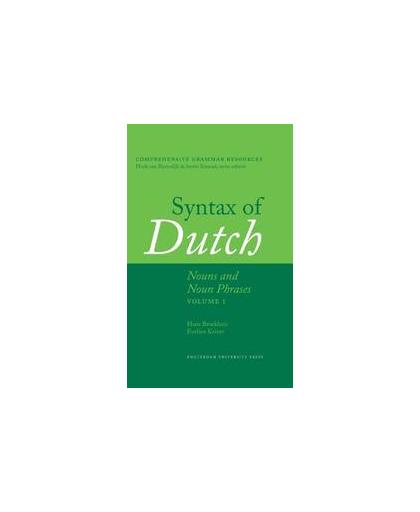

Syntax of Dutch: Nouns and noun phrases volume 1. Comprehensive Grammar Resources, Keizer, Evelien, Hardcover
Available at:
A grammar is a book that many people or companies have somewhere on their shelves. It is there to help them find the proper way of saying things in their language, which preposition to choose with a certain verb etc. It's there, but it is generally not used much. Few people realize that such grammar books that tell you what the grammatical structure of your language is supposed to be are grounded in a long tradition of scientific grammar writing. Scientific grammars explore the properties of your language; they try to find the system, the generalizations. They also try to investigate the ways in which your language differs structurally from grammars of other languages and, often surprisingly, how strikingly similar grammars of different languages can be if you arrange the data in certain ways and look at the structures in a somewhat more abstract way.
If you are a speaker of, say, Dutch, you have in your brain a grammar that helps you speak and write your language. But it also makes it possible for you to recognize a foreigner and to detect in what ways his sentences are ungrammatical. Scientific grammars constitute attempts at describing in a precise and enlightening way what this hidden knowledge in your brain is, how it is structured, why certain grammatical rules are the way they are.
The past fifty years or so have seen a veritable explosion of scientific work on grammar. Most of this work is in specialized articles that aim to argue specific claims about the structure of grammar in general, and that concentrate on a specific language only to put it in perspective against data from other languages. Furthermore, ways of talking about grammar, ways of presenting formal structures, ways of interpreting data have changed drastically in the course of a mere five decades. This makes things hard for those who look for serious answers to questions about the structure of a given language. At the same time the enormous explosion of the scientific work on an ever increasing number of languages makes presenting -the scientific grammar of language X' a daunting task. But the time is ripe to do it, and as Syntax of Dutch shows it can be done and done well.
What we present in this work, the Syntax of Dutch, is the very first such attempt. In view of the massive size of the material, the work concentrates on one central aspect of grammar, viz. the structure of sentences, that is, syntax.
[...]
Syntax of Dutch Nouns and noun phrases volume 1
A grammar is a book that many people or companies have somewhere on their shelves. It is there to help them find the proper way of saying things in their language, which preposition to choose with a certain verb etc. It's there, but it is generally not used much. Few people realize that such grammar books that tell you what the grammatical structure of your language is supposed to be are grounded in a long tradition of scientific grammar writing. Scientific grammars explore the properties of your language; they try to find the system, the generalizations. They also try to investigate the ways in which your language differs structurally from grammars of other languages and, often surprisingly, how strikingly similar grammars of different languages can be if you arrange the data in certain ways and look at the structures in a somewhat more abstract way.<br />If you are a speaker of, say, Dutch, you have in your brain a grammar that helps you speak and write your language. But it also makes it possible for you to recognize a foreigner and to detect in what ways his sentences are ungrammatical. Scientific grammars constitute attempts at describing in a precise and enlightening way what this hidden knowledge in your brain is, how it is structured, why certain grammatical rules are the way they are.<br />The past fifty years or so have seen a veritable explosion of scientific work on grammar. Most of this work is in specialized articles that aim to argue specific claims about the structure of grammar in general, and that concentrate on a specific language only to put it in perspective against data from other languages. Furthermore, ways of talking about grammar, ways of presenting formal structures, ways of interpreting data have changed drastically in the course of a mere five decades. This makes things hard for those who look for serious answers to questions about the structure of a given language. At the same time the enormous explosion of the scientific work on an ever increasing number of languages makes presenting -the scientific grammar of language X' a daunting task. But the time is ripe to do it, and as Syntax of Dutch shows it can be done and done well.<br />What we present in this work, the Syntax of Dutch, is the very first such attempt. In view of the massive size of the material, the work concentrates on one central aspect of grammar, viz. the structure of sentences, that is, syntax. <br />[...]<br />



